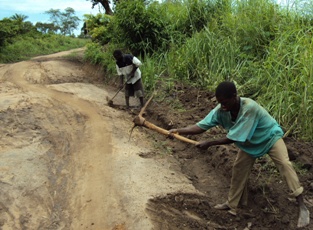USAID rehabilitates Roads in Western Equatoria’s Yambio county
By Richard Ruati
October 17, 2010 (LI-RANGU, WESTERN EQUATORIA) – Local labor-based road rehabilitation programs funded by the United States Agency for International Development (USAID) through its Sudan Infrastructure Services Project are helping to boost transport opportunities in rural areas, create jobs and build local capacity to improve and maintain feeder roads.

The objective of the labor-based road maintenance program is to provide sustainable access to economic and social services in the communities along the road, thereby improving livelihoods and reducing poverty.
In Western Equatoria, more than 70% of the rural road network is in poor condition, impairing the socio-economic activities of rural inhabitants. Rural roads are vital to the socio-economic and political development of rural communities. These roads provide access to schools, clinics, farms, markets, and neighboring rural communities. They also link rural areas to major road networks.
Routine labor-based road improvement activities include clearing obstructions such as cutting small branches from over hanging trees; cleaning existing drainage structures; clearing and maintaining side drains; repairing drain linings; collecting, transporting, and stocking material for road surface repair; masonry work; and trimming grass and other small plants to maintain horizontal visibility.
Manual laborers use basic hand tools to perform the work. No special skills are required, and all materials are readily available. Although it is simple, the work requires proper organization and regular supervision as specified in the project’s plans.
Ongoing USAID labor-based projects in the region have employed over 160 local, unskilled laborers.
One worker, Flora Kuare, is a widow who lost her husband in 2009. He left behind two children. In the same year, she lost her elder sister who also left behind six children leaving Flora with eight children to care for.
In her first two months on the Gangura road maintenance project she has been able to accumulate enough money to once again putting enough food on the table to feed her dependents.
“I have bought a ground nuts grinding-mill,” Flora said. “Many women in the neighborhood pay me a small amount of money as cost sharing.”
Nelson Abbas, the Managing Director of Gbudue Construction Company, a local said that he hopes to complete the job in the next six months.
Western Equatoria state minister for Physical Infrastructure, Eng Boutros Magaya, told Sudan Tribune that he supports this as it improves “the socio-economic status of the people.”
The projects have raised confidence and hope among the enthusiastic workers. Local economic activities along the roadside, such as restaurants and small boutiques, are on the rise.
The local chief’s deputy, Rangu, advised the unemployed especially young people to embrace the labor-based method, asserting that “government cannot alone solve unemployment”. He asked that other civil society groups should come to the assistance of the unemployed in the society so that the rural areas can be better places to live.
(ST)
